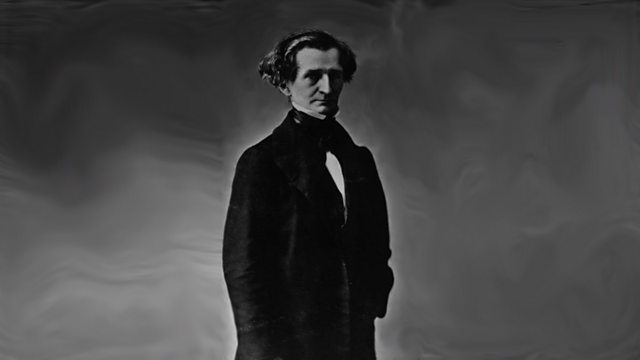
The Literary Muse
Donald Macleod explores the life and music of Hector Berlioz. Today, he delves into the world of Berlioz’s literary muses – first and foremost, Virgil, Goethe and Shakespeare
Donald Macleod explores the life and music of Hector Berlioz. Today, he delves into the world of Berlioz’s literary muses – first and foremost, Virgil, Goethe and Shakespeare.
Berlioz was home-schooled by his father, Louis, in the picturesque village of La Côte Saint-André in the southeast of France, not far from Grenoble. Louis Berlioz was a doctor – a man, as his son would later write, with “a naturally liberal mind: that is, without any kind of social, political or religious prejudice”. He also had a deep love of literature, which he duly transmitted to young Hector. Most of all, he instilled in his son a passion for the Latin poet Virgil, whose epic masterpiece The Aeneid relates the legend of the wandering Trojan hero who overcame adversity to become the founding father of Ancient Rome. Forty years on, Berlioz conceived his opera Les Troyens, The Trojans, based on the events Virgil so compellingly describes – not least the death of Dido, a passage which reduced the young Berlioz to “nervous shuddering” when he had to translate it for his father. Goethe and Shakespeare were later but no less crucial discoveries. The former’s Faust, which Berlioz read in the French translation of Gérard de Nerval, inspired his early 8 Scenes from Faust, which later blossomed into one of his mature masterpieces, The Damnation of Faust. Shakespeare was a more traumatic encounter; Berlioz was so thunderstruck by the performance of Hamlet he saw in the Odéon Theatre in Paris on the 11th of September 1827 that at first he vowed never again to expose himself to “the flame of Shakespeare’s genius”. But it was a promise he was unable to keep, and the production of Romeo and Juliet he witnessed a few days later was to impact his life in two highly significant ways: it sowed the seed of one of his greatest works, the ‘dramatic symphony’ Roméo et Juliette; and it introduced him to the Irish actress Harriet Smithson, the Juliet of the Odéon production. Berlioz and Smithson would eventually marry – like Romeo and Juliet, it didn’t end well.
La Damnation de Faust, Op 24 (Part 2, ‘Un puce gentille’)
José van Dam, baritone (Mephistopheles)
Orchestre et Choeur de Opéra de Lyon
Kent Nagano, conductor
Waverley, grande ouverture, Op 1
Bergen Philharmonic Orchestra
Andrew Davis, conductor
Les Troyens, Op 29 (Act 1, finale)
Petra Lang, mezzo soprano (Cassandra)
London Symphony Orchestra
Colin Davis, conductor
Marche funèbre pour la dernière scène d'Hamlet (Tristia, Op 18)
Orchestre Révolutionnaire et Romantique
The Monteverdi Choir
John Eliot Gardiner, conductor
La Captive, Op 12
Véronique Gens, mezzo-soprano
Orchestre de l'Opéra National de Lyon
Louis Langrée, conductor
Harold en Italie, Op 16 (IV. Orgie des brigands)
William Primrose, viola
Boston Symphony Orchestra
Charles Munch, conductor
Produced by Chris Barstow for BBC Wales
Last on
Music Played
-
![]()
Hector Berlioz
La Damnation de Faust: Part 2 'Une puce gentille'
Singer: José van Dam. Orchestra: Lyon Opera Orchestra. Choir: Lyon Opera Chorus. Conductor: Kent Nagano.- ERATO : 0630-10692-2.
- ERATO.
- 10.
-
![]()
Hector Berlioz
Waverley - Grande Ouverture, Op 1
Conductor: Sir Andrew Davis. Orchestra: Bergen Philharmonic Orchestra.- Chandos CHSA 5118.
- Chandos.
- 5.
-
![]()
Hector Berlioz
Les Troyens: Act I, finale
Singer: Petra Lang. Orchestra: London Symphony Orchestra. Conductor: Colin Davis.- LSO LIVE : LSO-0010.
- LSO LIVE.
- 13.
-
![]()
Hector Berlioz
Marche funèbre pour la dernière scène d'Hamlet (Tristia, Op 18)
Orchestra: Orchestre Révolutionnaire et Romantique. Choir: Monteverdi Choir. Conductor: Sir John Eliot Gardiner.- PHILIPS 4466762.
- PHILIPS.
- 7.
-
![]()
Hector Berlioz
La Captive, Op 12
Singer: Véronique Gens. Orchestra: Lyon Opera Orchestra. Conductor: Louis Langrée.- ERATO 5454222.
- ERATO.
- 8.
-
![]()
Hector Berlioz
Harold en Italie, Op 16: IV. Orgie des brigands
Performer: William Primrose. Orchestra: Boston Symphony Orchestra. Conductor: Charles Munch.- SONY: 88697720602.
- SONY.
- 4.
Broadcast
- Tue 12 Mar 2019 12:00BBC Radio 3








